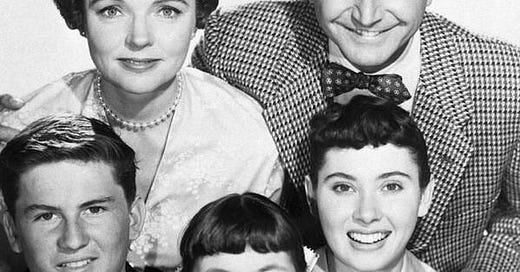“Father Knows Best”
Do you remember the iconic television show from the 1950s, which portrayed not only the ideal father who solved all problems but also the perfectly happy and well-adjusted family?
Jim and Margaret Anderson were the father and mother of three children. Jim and Margaret were always the voices of reason. Jim’s character was that of a thoughtful father who offered sage advice in response to his children’s problems. He was a responsible man who loved his wife and children, always doing his best to provide them with a better life. Jim was a salesman and manager of the General Insurance Company in Springfield. Margaret was a housewife. She was also calm, steady, and wise. The Andersons were an idealized family that represented an image of the way the nation saw itself during the post-World War II decade. The family that most viewers could relate to.
The impact of ‘Father Knows Best’ on American culture is undeniable. Its influence reverberated in creating many family sitcoms that followed, such as the iconic Leave It to Beaver and The Brady Bunch.
In summary, Father Knows Best is a testament to television’s power to shape societal norms and provide a comforting escape from reality.
Its idealized portrayal of family life offered a model of harmony and understanding that resonated deeply with audiences, making it one of the most beloved television programs of its time.
A personal note:
I was about 10 when the program aired. I love the program and watch it religiously. However, I needed some help with various aspects of the program that I needed help to relate to. The Andersons lived in this wonderful Suburban House. However, I grew up in a walk-up apartment building in the Bronx. Yet, my major problem with the program was needing a father. I was about 2 to 3 years old when my parents divorced, and my mother took my older brother and me to live with her parents in the Bronx from Baltimore, Maryland. My brother is 6 years older than I am and has memories of our father. However, for me, the whole concept of father was a blank.
The following applies to both parents working jointly to raise the family.
Fathers contribute to their children’s emotional, psychological, and social development in ways that are often immeasurable. While the traditional view of a father’s role has developed, paternal influence remains a cornerstone of family dynamics and child development, which we should all appreciate.
Fathers provide a sense of security and stability within the family unit. Their presence often reassures children, offering a reliable figure to turn to in times of need. This sense of security is crucial for children’s emotional well-being, as it fosters a safe environment where they can express themselves and explore their identities without fear. A father’s involvement in a child’s life can significantly reduce anxiety and build self-esteem, contributing to a well-rounded and confident individual.
Moreover, fathers play a pivotal role in modeling behavior and setting standards. Children often look up to their fathers as role models, imitating their actions and internalizing their values. A father’s problem-solving approach, work ethic, and interactions with others provide a blueprint for children to develop their behaviors and attitudes. This modeling also extends to relationships, as fathers show how to treat others with respect, kindness, and integrity, shaping how children interact with the world around them.
The emotional bond between a father and his children is equally important. Fathers actively involved in their children’s lives often form deep, meaningful connections that contribute to the family’s emotional health. These bonds are built through shared experiences, communication, and understanding. Fathers can offer support, encouragement, and love by being present and engaged, which are vital components of a child’s emotional development.
Besides emotional support, fathers contribute to their children’s cognitive and academic growth. Studies have shown that children with involved fathers perform better academically and are more likely to pursue higher education. Fathers often engage in activities stimulating intellectual curiosity and problem-solving skills, such as reading together, playing educational games, or exploring new interests. This engagement helps to develop a child’s cognitive abilities and fosters a lifelong love of learning.





That was one of the shows I watched when I was a child! I also watched, Leave it to Beaver, Ozzie and Harriet My Three Sons and other shows with a normal, healthy family lifestyle! I always wished my family was like that! My father was much older than my mom and we just didn't communicate! He lived in his world and I lived in mine! I had friends whose fathers were involved in their lives. I could tell the difference between their fathers and mine! Oh, I could tell you about his drinking and the few times I ran from him when he wanted to spank me with his belt or stick! My father died of heart problems in 1968 on my graduation day. I was only 18.